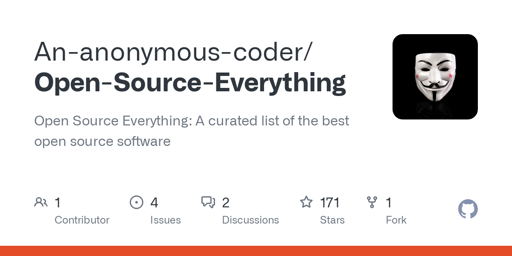- cross-posted to:
- [email protected]
- cross-posted to:
- [email protected]
Hello Lemmy!
I’m excited to celebrate the 100th release of my project, Open Source Everything! Open Source Everything is my own curated list of open source (or at least source-available) software. It started out with a bit of a bumpy start, even being deleted at one point, but the project is still going strong!
Over the past 4 months, the project has seen releases, both big and small, but it has grown so much since its initial release. It started out with a small list of 128 software I’d kept on my phone for months, but since then it has over doubled, and now has almost 300 pieces of software listed! It’s truly inspiring to see the community come together and help the list out, so thank you very much to everyone who suggested software and contributed to the list!
With that said, the list has a long way to go. There are many sections that need improvement, and many mistakes to be fixed. I try to focus on quality over quantity, which means a lot of the software needs to be personally tested before I can definitively make sure that it belongs on the list. Of course, that’s difficult for one person to achieve. I kindly ask for community feedback on software listed there, and if you feel there is a better alternative, please let me know!
I’m also considering moving Open Source Everything to a website structure, since I’m currently limited by the functionality of a markdown file. If there’s some way to do inline tables and rounded images in a markdown file, let me know. Otherwise, I’ll start working on creating a website for it.
Finally, if you’re a good SVG artist, many of the software logos don’t have high quality svg options available (or some SVGs, like Wikipedia, are broken for whatever reason). I would appreciate anyone with the skills available to help replace all PNG images with SVG counterparts, especially projects that are missing logos.
Thank you so much all of you, and I hope to make 2025 a great year for Open Source Everything!
P.S. Open Source Everything is hosted on GitLab, and mirrored on GitHub. I’m linking to the GitHub version because it supports slightly better formatting and header links are broken on GitLab due to a bug.
Love the list… And finally bookmarked it…
I always forget the list when i am using a new software… Thanks for reminding
Android recommendations for next version:
I suggest QR Scanner because it can both read and generate and does not ask for network access unlike Binary Eye. It has a nice and intuitive UI but also manages to do advanced stuff.
Thunderbird is already on the list but there’s an android version now. It’s based on K-9 and has gotten really good for a mobile e-mail client.
I know a lot of people like Breezy Weather (I was one of them) but the simplicity of Bura makes it perfect in my eyes. The fact that it doesn’t have a graph for air quality or animated lock screens that match the weather makes it a fraction of the weight, really fast and does not ask for even half of the same permissions. I switched to Bura after noticing that it doesn’t need to run in the background since it’s so fast when you open it. It’s still prettier than the absolute most basic ones though.
Hi there!
Thanks for the suggestions! I’ll definitely look into QR Scanner. Most camera apps come with some QR code scanning functionality built in, so there’s not much use in having a dedicated app. However, as you mentioned, network permissions can be a deciding factor. Someone may want the camera app to have network permissions, but not the QR scanning app.
Thank you for letting me know that Thunderbird is available for Android now! If you find any other incorrect platforms, please let me know. I’ve based almost all of the platform information based on what is listed on https://alternativeto.net/, so there are likely dozens of mistakes. I’ve found a few myself.
I use Breezy Weather and love it. A quick look at Bura, and it actually looks like an Android clone of the default iOS weather app, which is really cool. From the screenshots, I don’t see many differences, so I’m excited to try it out and see how similar it is. Breezy Weather runs in the background to provide notifications such as upcoming precipitation, etc. so that isn’t much of a deciding factor.
I will note, it’s unlikely that Breezy Weather will be replaced with Bura, simply because Breezy Weather is recommended more often by the community. Even though my list is curated, it doesn’t always reflect my preferred options (hence the “my top choices” stamp).
For example, I prefer Book’s Story instead of Librera Reader as an ebook reader, and Read You instead of Feeder as an RSS reader. However, since Librera Reader and Feeder are recommended more often (and have no major issues), those are what are listed.
I hate the UI of Librera Reader. Feeder is missing features such as a search functionality, but I don’t have any oppositions to it, so I still gave it the “my top choices” stamp, especially since Read You is a little weird about some functionality. Anyways, thanks for putting Bura on my radar. I’ll still check it out and, if there’s a massive benefit over Breezy Weather, it might replace it.
Thank you so much!
Edit: Bura fascinates me. It’s not an exact clone of the iOS weather app, but more like if the iOS weather app was done in Material Design. It’s very familiar to me, having used iOS my entire life until a few months ago. However, its simplicity, while an upside for some, is a bit of a downside for this list. Breezy Weather has a vast amount of customization, including customizing weather sources, which Bura doesn’t have. It’s a cool app though!
Edit 2: I tried out all Android QR code readers I could find, and settled on this one which is nearly the gold standard in my opinion. However, it does ask for network permissions. If you use GrapheneOS you can disable it, and it will work fine.
Hey, QR Scanner you linked is pretty good. Even has the option to share contacts into the app to generate QR code for them, which is something not every QR app can do well.
Thanks for the recommendation, I think I’ll use this now.
What does a “release” mean in this context?
Every time a significant update to the list has been made, the version code is bumped and a new release is made. Sometimes there are hot fixes such as a broken SVG, for example.
recommend ardour for music production
Do you have experience with LMMS or MuseScore Studio? If so, what benefit does Ardour provide over them?
Do you have experience, thoughts on LMMS? I’m a Logic Pro user but Ive heard good things about Ardour for years
Forgejo for self-hosted source control?








